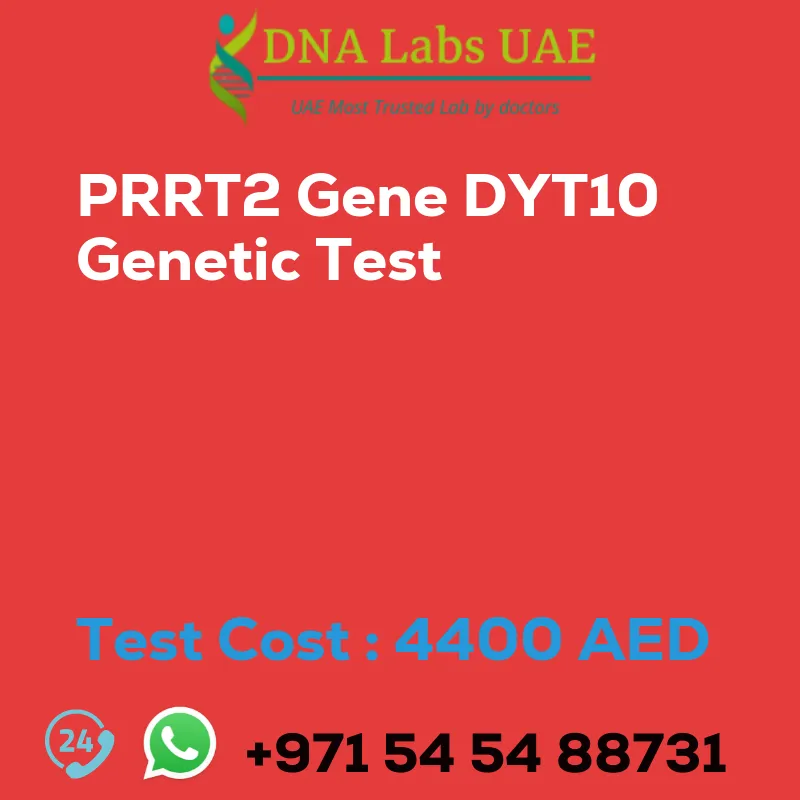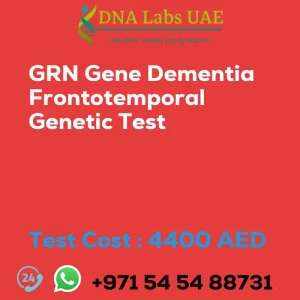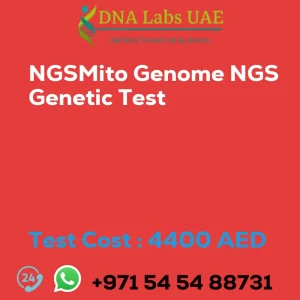PRRT2 Gene DYT10 Genetic Test
Components: PRRT2 Gene DYT10 Genetic Test
Price: 4400.0 AED
Sample Condition: Blood or Extracted DNA or One drop Blood on FTA Card
Report Delivery: 3 to 4 Weeks
Method: NGS Technology
Test Type: Neurological Disorders
Doctor: Neurologist
Test Department: Genetics
Pre Test Information: Clinical History of Patient who is going for PRRT2 Gene DYT10 NGS Genetic DNA Test. A Genetic Counselling session to draw a pedigree chart of family members affected with PRRT2 Gene DYT10.
Test Details: The PRRT2 gene is associated with a rare genetic movement disorder called paroxysmal dyskinesia. The disorder is characterized by sudden, involuntary movements or spasms that can affect the arms, legs, face, or trunk. The movements can be triggered by stress, fatigue, or certain medications. The PRRT2 gene is also known as DYT10, and mutations in this gene have been linked to other movement disorders, such as benign familial infantile seizures and episodic ataxia. NGS genetic testing for the PRRT2 gene can help diagnose paroxysmal dyskinesia and other related movement disorders. The test involves sequencing the DNA of the patient to identify any mutations or variations in the PRRT2 gene. Early diagnosis and treatment of paroxysmal dyskinesia can help manage symptoms and improve quality of life for patients. Genetic testing can also help identify carriers of the PRRT2 gene mutation, which can be important for family planning and genetic counseling.
| Test Name | PRRT2 Gene DYT10 Genetic Test |
|---|---|
| Components | |
| Price | 4400.0 AED |
| Sample Condition | Blood or Extracted DNA or One drop Blood on FTA Card o |
| Report Delivery | 3 to 4 Weeks |
| Method | NGS Technology |
| Test type | Neurological Disorders |
| Doctor | Neurologist |
| Test Department: | Genetics |
| Pre Test Information | Clinical History of Patient who is going for PRRT2 Gene DYT10 NGS Genetic DNA Test A Genetic Counselling session to draw a pedigree chart of family members affected with PRRT2 Gene DYT10 |
| Test Details |
The PRRT2 gene is associated with a rare genetic movement disorder called paroxysmal dyskinesia. The disorder is characterized by sudden, involuntary movements or spasms that can affect the arms, legs, face, or trunk. The movements can be triggered by stress, fatigue, or certain medications. The PRRT2 gene is also known as DYT10, and mutations in this gene have been linked to other movement disorders, such as benign familial infantile seizures and episodic ataxia. NGS genetic testing for the PRRT2 gene can help diagnose paroxysmal dyskinesia and other related movement disorders. The test involves sequencing the DNA of the patient to identify any mutations or variations in the PRRT2 gene. Early diagnosis and treatment of paroxysmal dyskinesia can help manage symptoms and improve quality of life for patients. Genetic testing can also help identify carriers of the PRRT2 gene mutation, which can be important for family planning and genetic counseling. |








